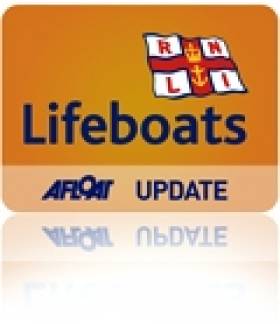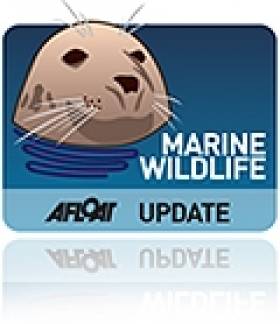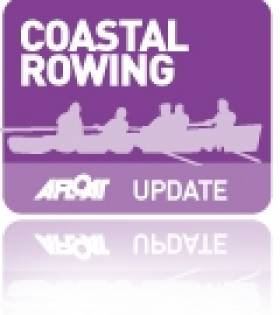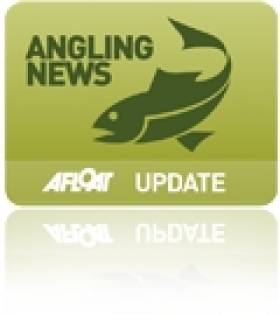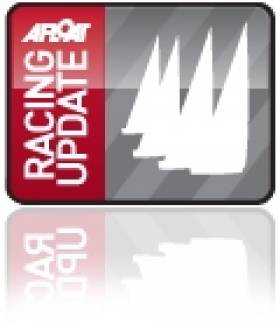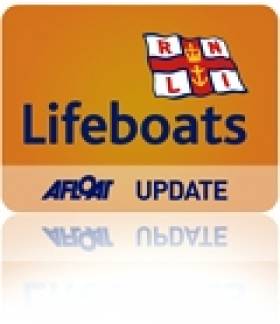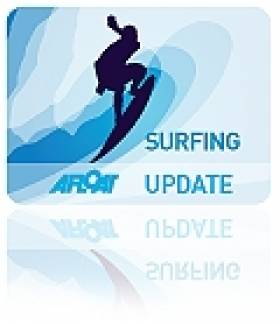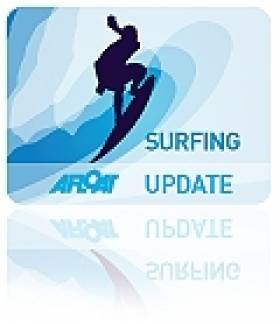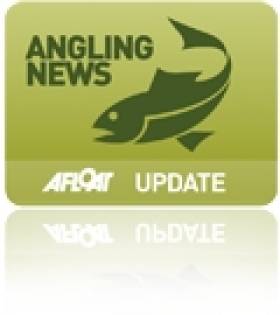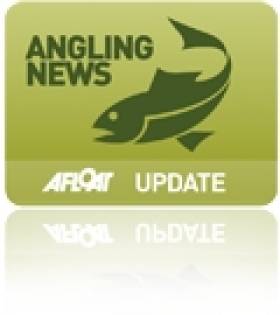Displaying items by tag: Antrim
Red Bay Lifeboat Recovers Body From Antrim Coast
#RNLI - Red Bay RNLI was involved in the recovery of a man’s body off the Antrim coast yesterday (Friday 11 October).
The volunteer lifeboat crew was requested to launch its inshore lifeboat at 4pm, and they recovered the body from the water south of Glenarm.
Red Bay RNLI lifeboat operations manager Andrew McAlister said: "We can confirm that the lifeboat crew recovered a body this afternoon. Red Bay RNLI would like to extend its sympathy with the family of the deceased."
In more positive news, members of the Hegarty family - who lost two brothers to the sea in separate incidents over the years - raised €315 for Crosshaven RNLI at the Cork Evening Echo Mini Marathon recently.
Cousins Anna Hegarty and Abbey O'Brien received a tour of the lifeboat station and took away gifts presented to them by the crew.
Rarely Seen Sei Whale Dies On North Antrim Beach
#MarineWildlife - Following Friday's news of a rare whale sighting off the continental shelf, BBC News reports on a sadder whale story in Co Antrim, as a juvenile Sei whale died after it was was found beached early yesterday (14 September).
The deep ocean whale, said to be "incredibly rare" in Irish waters, was discovered on the sand beside Red Bay pier near Waterfoot on the North Antrim coast.
Despite being at least 8.5 metres long, it was still only a calf, "so the likelihood is that it would have still have been attended by its mother" before it got lost in the shallows, according to the Irish Whale and Dolphin Group's Ian Enlander.
Sadly, refloating the whale was not an option as it was stuck deep into the soft sand, and it died before a vet could attend. It's expected that an autopsy tomorrow will shed some light on the cause of death.
The upsetting news comes seven years after the last Sei whale seen in the region, a 10m juvenile that was euthanised after swimming into Larne Lough and beaching. That had been the first recorded stranding of the species in Ireland since 1914.
Coastal Rowers Converge on Carnlough for All-Ireland
#AllIrelandCoastal: The All-Ireland Coastal Rowing Championships have drawn an entry of 361 crews from 35 clubs (equivalent to 1800 rowers competing) to Carnlough in County Antrim this weekend. Competition begins today and runs through to Sunday. The organisers hope to have live webcam coverage on livestream
Friday Race Order – Start Time 4pm.
1. Open Classic Men
2. Open Classic Ladies
3. FISA X2 Men
4. FISA X1 Ladies
5. Cork Yawl Men
6. Cork Yawl Ladies
7. FISA X2 Ladies
8. FISA X1 Men
Saturday Race Order – Start Time 9am.
1. Mixed Vets – Heat 1
2. Mixed Vets – Heat 2
3. U12 Girls – Final
4. U21 Ladies – Final
5. Senior Mixed – Heat 1
6. Senior Mixed – Heat 2
7. U16's – Heat 1
8. U16's – Heat 2
9. U14 Girls – Heat 1
10. U14 Girls – Heat 2
11. Masters Ladies & Masters Men – Final
12. Heritage Ladies – Final
13. Heritage Men – Final
14. U18's – Heat 1
15. U18's – Heat 2
16. U16 Ladies – Heat 1
17. U16 Ladies – Heat 2
18. Vet Ladies – Heat 1
19. Vet Ladies – Heat 2
20. U14's – Heat 1
21. U14's – Heat 2
22. Junior Ladies – Heat 1
23. Junior Ladies – Heat 2
24. Intermediate Men – Heat 1
25. Intermediate Men – Heat 2
26. Senior Men – Heat 1
27. Senior Men – Heat 2
Sunday Race Order – Start Time 9am.
1. Vet Men
2. Senior Mixed
3. U12's
4. Pre-Vet Mixed
5. U18's
6. Vet Ladies
7. U16 Girls
8. U14's
9. Pre-Vet Men
10. U18 Ladies
11. Mixed Vets
12. U21's
13. Pre-Vet Ladies
14. U14 Girls
15. U16's
16. Intermediate Ladies
17. Junior Ladies
18. Senior Ladies
19. Intermediate Men
20. Junior Men
21. Senior Men.
35 clubs, 361 crews which equals 1800 rowers participating.
#Angling - The World Youth Fly Fishing Championship is coming to Ireland's border region next month.
And as the Carrick Times reports, Carrickfergus in Co Antrim is looking forward to hosting part of the event at the Woodford Fly Fishery.
What's more, local lad and Woodford member Darren Crawford will be among the all-Ireland fly fishing squad vying for the international title at the event, co-sponsored by the Loughs Agency and Inland Fisheries Ireland.
Rivers and lakes hosting the competition are spread over the counties of Antrim, Louth, Monaghan, Meath and Tyrone.
In other inland fisheries news, Galway Bay FM reports that testing carried out after a fish kill in Loughrea Lake last month found no evidence of any bacterial or viral outbreak.
The cause of the incident that killed 100 perch in the lake are still unclear, though stresses connected with the spawning season are a distinct possibility.
New Northern Ireland Yacht Race for Meningitis Trust
The great circumnavigation of Larne Lough, a 'chase race' for Meningitis is a brand new event on the Irish sailing calendar. But what is it?
To be held on Saturday 7th September and hosted by East Antrim Boat Club, it is a type of pursuit race. However in reaching into every possible creek of the Lough, together with a variety of 'on-course hurdles,' it will be a race like no other. How many races have a built in roundabout to navigate? Overall it is a fundraising day drenched with fun, frolics and challenges.
Open to mono-hulled dinghies, day boats and sports boats with a Portsmouth Yardstick number between 900 and 1600 the day will actually consist of two races; one is for the juniors which will precede the main race. Both races will feature windward starts.
The driving force for the Meningitis Chase Race is the Jobling family. Tom and Jane lost their three-year-old grandson Stanley to Meningitis. The family are well known in competitive sailing circles but this is the first time that they have taken their fundraising campaigns afloat.
Tom Jobling said; "Stanley was always a fun loving boy, always joking, smiling so another boring old sailboat race wouldn't suit him at all. The day on Larne Lough will be full of surprises, both on and off the water. Stanley's dad Barry, himself a champion sailor will be delighted if our two key objectives can be achieved.' Tom's daughter Gemma continued, "We want at least 50 assorted boats out on the water and have raised £1,000 for the Meningitis Trust. And of course have remembered Stan's smile."
Information on the Meningitis Chase Race will filter out as the big day approaches but in the meantime call the Jobling family (tel) 0044(0)2827 6960 (091 from RoI) or look into www.thechaserace.co.uk Information is also available from the East Antrim Boat Club website; www.eabc.org.uk
Portrush Lifeboat Rescues Stranded Kayaker
#RNLI - Portrush RNLI has rescued a kayaker who got into difficulty off the Co Antrim coast.
The volunteer lifeboat crew had an early call out on Sunday morning (17 February) to the kayaker who got into trouble on the water at West Bay.
There were strong southerly winds at time which caused a swell. The kayak capsized and was whipped by the prevailing wind into the harbour area, leaving the kayaker stranded and treading water.
A Portrush lifeboat crew member who witnessed the scene on the West Strand spotted the incident and promptly raised the alarm.
The inshore lifeboat crew - including Mark Mitchell as helm, Andy McClelland and Stevie Ritchie - launched within minutes and had the kayaker back at base within 20 minutes.
Portrush RNLI lifeboat operations manager Robin Cardwell said: "The kayaker was very fortunate as the winds were quite strong in the West Bay. Our volunteer crew launched quickly and was able to bring him back to shore safely."
Up Close and Personal with NI Big Wave Surfer Al Mennie
#SURFING - Top press photographer Charles McQuillan recently travelled to Northern Ireland to capture big wave surfing pro Al Mennie in training for the winter season, as The Irish Times reports.
McQuillan set out to document every aspect of Mennie's surfing life on the north Antrim coast, from the pre-dawn starts and protein-heavy breakfasts to the gruelling solo training sessions and the thrill of the surf itself.
And he made sure to get up close and personal with his subject, using waterproofing equipment to photograph him underwater - and even following him on a jet-ski to the secret offshore surfing spots known only to Mennie and his fellow big wavers.
The snapper described the surfer as "incredibly at home" in the water. Not surprising for a man used to taking on the enormous Finn McCool swells off the Giant's Causeway, or paddling across the North Channel for charity as he did this past spring (see more pics of Mennie surfing HERE).
As Mennie tells the Belfast Telegraph, he has the good fortune to be able to ride “the biggest, scariest waves on the planet” in his own backyard.
It comes at a price - Mennie must be in peak physical condition at all times, as one never knows when the big one might come - but it's a price he's more than willing to pay, with his body and his mind.
“Big-wave surfing is at least 80 per cent to do with your mind, and the physical aspect boosts the mental side," he tells The Irish Times. "I don’t feel 100 per cent in myself unless I’m training properly.”
Meanwhile, The Irish Times also highlights the best places to get your wetsuit on and go surfing in Ireland during the increasingly popular winter season, with schools in the hotspots of Lahinch in Co Clare - the focus of a new book by journalist Keith Duggan - and Bundoran, Co Donegal upgrading to meet the demand.
And even if its waves aren't up to scratch, the east coast still is getting some of the action, with stand-up paddleboarding (SUP) becoming the latest way to ease into the sport.
Al Mennie's Epic Charity Paddle from Giant's Causeway
#SURFING - Northern Irish surf pro Al Mennie will be taking on a different challenge later this month, when he sets out to paddle a surfboard from the Giant's Causeway to Scotland in the name of charity.
"It will be the northernmost crossing of its type in the world," says Mennie of the 25-mile route from Antrim to the Scottish island of Islay.
"I will have to deal with freezing cold temperatures, large open ocean swell, potentially high winds and the deadly currents around a well known navigational hazard of a North Atlantic island."
Mennie will be on his own except for a support boat carrying food and water. He will be wearing a 6mm wetsuit and crossing the most dangerous stretch of water around the Irish coastline, "known for its extremely deadly currents as the Irish Sea tides drain between Rathlin Island and Northern Ireland".
The NI surfer is embarking on the challenge in aid of Northern Ireland Chest Heart and Stroke, which is a charity close to his own heart.
"My dad died suddenly of a heart attack aged 50 and I know lots of people who have also lost loved ones to heart problems too," he says, "so I really want to help make a difference by raising money for this charity."
For more details or to make a donation, visit the charity page at Al Mennie's website HERE.
NI Anglers Take to Facebook to Save Their Salmon
#ANGLING - Northern Ireland river anglers are taking a novel approach to lobbying Stormont over salmon exploitation by harnessing the power of social networking.
According to the News Letter, the NoSalmonNets campaigners "have swapped their fishing rods for laptop computers", using Facebook to attract support for their campaign to bring an end to the offshore netting of wild salmon stocks.
As previously reported on Afloat.ie, Northern Ireland's Department of Culture, Arts and Leisure (DCAL) has called for a voluntary ban on offshore salmon fishing, following new research that shows a significant drop in their numbers in the North's rivers.
Seamus Donnelly of NoSalmonNets has welcomed DCAL's recent decision to stop issusing licences for commercial salmon nets that may "contravene European law" off Antrim's north coast, made in an effort to protect salmon stocks in the Foyle river system.
Donnelly explained that the campaign was borne from frustration at the apparent inaction by the NI Executive over the protection of salmon.
“One of the keys to our success has to be Facebook," he said. "The internet has an unlimited reach and we took advantage of that.”
The News Letter has more on the story HERE.
NI Taxpayers Could Foot the Bill for Fines Over Dwindling Salmon Stocks
#ANGLING - Northern Ireland's taxpayers could be left with a bill for millions in EU fines if action isn't taken to reverse the decline of salmon stocks, the News Letter reports.
Ulster Unionist MLA Robin Swann said he believes that voluntary measures to help protect the North's Altantic salmon will not remove the threat of "fines which would likely run into millions which [the people of NI] will end up paying".
As previously reported on Afloat.ie, NI's Fisheries Minister Carál Ní Chuilín called on offshore anglers and commercial fishermen to forego applying for 2012 salmon licences.
Annual monitoring of the North's salmon rivers has shown a failure to reach targets most years since 2002, with the survival rate of salmon in the marine phases in some cases dropping to as little as 5%.
Coastal drift nets and bag nets off the north Antrim coast - which contravene EU directives - have been blamed for intercepting salmon stocks before they reach the rivers, and anglers and conservation groups have already called for a ban.
But Swann says that Department of Culture, Arts and Leisure (DCAL) does not yet have the legislative power to stop them.
The News Letter has more on the story HERE.



























